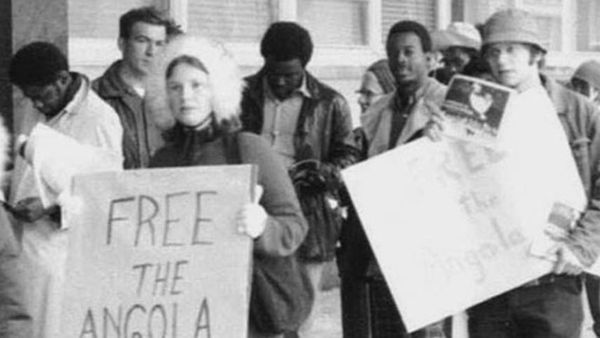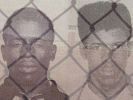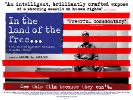Eye For Film >> Movies >> In The Land of the Free... (2010) Film Review
In The Land of the Free...
Reviewed by: Jeff Robson

The term 'solitary confinement' conjures up images of systematic torture in Third World or Eastern Bloc dictatorships; 19th century ‘bread and water’ ordeals as fictionalised in The Count Of Monte Cristo; in other words, not something that has any place in the prison system of a modern democracy.
But in Louisiana, three black men have, between them, spent over a century in isolation for 23 hours a day, seven days a week. Jean’s passionate, slow-burning examination of how this could be allowed to happen makes for one of the best documentaries in a year already well-supplied with them.

Albert Woodfox, Herman Wallace and Robert King were, by their own admission ‘no angels’. They were convicted in the late Sixties of relatively minor offences: Wallace for bank robbery; King for an armed robbery he insists was a frame-up; and Woodfox for, er, fleeing from police after stealing a cement mixer while on remand.
They wound up in the Angola penitentiary, America’s largest prison. Built on the site of a plantation named after the African country that supplied most of its slaves, it’s at the heart of a state where, the film makes pretty clear, the Civil Rights movement is a distant sun whose light hasn’t penetrated the darker corners of authority.
All three men had connections with the Black Panthers, the militant African-American revolutionary party. Upon arrival, they began agitation for reform to the appalling conditions and systematic violence (sexual and otherwise) that they saw. After several years of organising protests, they were implicated in the 1972 murder of prison guard Brent Miller.
There was no physical evidence, King was not even in the jail at that time and a key witness was granted early release. But this was enough for the prison authorities to convict Woodfox and Wallace of committing the murder and investigate King on suspicion of organising it. Then their ordeal really began.
Without ladling on the grimness, Jean makes clear what the realities are of ‘locking them up and throwing away the key’. They spend all but one hour of every day in a cell 'about the size of a bathroom’. Their only contact with the outside world comes through time-limited and monitored phone calls. This would seem harsh enough even were their convictions beyond any doubt. Given such a strong suspicion of a miscarriage of justice, it’s nothing short of scandalous.
Eventually, lawyers and reformers in the Louisiana judicial system began to think so too, and took a closer look at the evidence. King’s time in solitary had been extended due to his (equally suspect) implication in the murder of an inmate. In 2001, after pleading guilty to a lesser charge over the killing, he was released – and immediately began campaigning to secure the freedom of Woodfox and Wallace.
The film follows the campaigners’ efforts as they take on a monolithic institution determined not to admit any mistakes. Jean was not allowed to interview the two men still in prison; recordings of phone calls from them are their only opportunity to make their voices heard.
But King’s interviews to camera are compelling. He's articulate and restrained. An ordeal that would test anyone’s sanity (or capacity to forgive) has clearly left a mark on him, but he seems to have risen above bitterness and hatred to a degree that I find remarkable.
Equally impressive is the testimony of Miller’s widow, a woman who lost her husband at the age of 17 but eloquently and passionately argues that, if the wrong men were convicted for his death, that’s just not good enough. All of the supporting interviews (including with those convinced that the three men were guilty and justice has been, and continues to be, done) are equally striking.
Jackson’s narrative, like the film as a whole, is committed but calm, letting the facts speak for themselves. And the mood and atmosphere of Louisiana, and America, in its most turbulent years is vividly conveyed.
That’s all the more remarkable given that Jean is a filmmaker better known for quintessentially British narrative works like Leon The Pig Farmer, Clockwork Mice and Sky’s Terry Pratchett adaptations. He became aware of the Angola Three through his friendship with the late Anita Roddick, founder of The Body Shop and one of many high-profile campaigners who have taken up the men’s case.
As is often the case, he brings an outsider’s freshness and a storyteller’s feel to the film. Occasionally the temptation to go overboard on the period archive footage and rail at the deficiencies of the US justice system in general deflects the focus from the compelling story at its heart.
But that’s a minor quibble. This is documentary cinema at its most powerful; arguing honestly and forcefully that, in a country whose Bill Of Rights specifically forbids ‘cruel or unusual punishment’ cases like that of The Angola Three should not exist.
Reviewed on: 29 Apr 2010
















